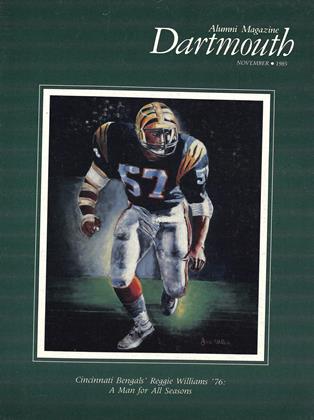There is a teacher shortage in public
education - that's not news, but what Dartmouth is doing about it is. The College's education department has developed an innovative program giving qualified students a tuition-free term to complete their practice teaching. Faith Dunne, chair of the education department, expects that for some students this program will make the difference between their being certified to teach in public schools and not.
Most of the education courses required for certification can be integrated into a regular liberal arts program. Practice teaching and its associated coursework, however, must be done together in one term. This means students must sometimes make the choice between practice teaching and going on a foreign study program or writing an honors thesis. When faced with this choice, many students opt for the exciting foreign study or the challenging honors work. Says Dunne, "People shouldn't have to choose between preparing for social service and getting the best out of a good education."
So Dunne and her colleagues set out to find a way to make it easier for undergraduates to become certified. After a lot of negotiation, the tuition-free term was approved this summer. Now students can fulfill all the regular requirements for graduation; then, either as one of the 12 required terms or as an additional term up to a year later, students can take a free term to do their practice teaching.
Called the Arts and Sciences Teacher Certification Scholarship, the program is a notable first for Dartmouth. Richard Kunkel, executive director of the National Council for Accreditation of Teacher Education in Washington, D.C., said he knows of no other college in the country offering a similar incentive. "Our peers at other colleges want to use this as a model," says Dunne.
Because the program was just approved, students had very little time to apply for this fall. Anita Charles '85, however, had already arranged for an extra term to do her practice teaching in English and French at Hanover's middle school and high school. Having graduated in June with the required education courses, she was immediately eligible. The program is a boon for Charles, Dunne says, because she worked her way through college on financial aid and had arranged to borrow the money for her practice teaching term. The scholarship will save her about $4,000.
The response of Dartmouth-trained teachers already in the classroom is also positive. Anne Ready '85, who did her practice teaching before graduating last June, is teaching at the Thetford, Vt., elemetary school this year. She's excited about the scholarship term and believes "it will be a big incentive."
Edward Roundy '47 'Will retire at the end of this year, having taught in public schools for 38 years. He feels this kind of program is only "a drop in the bucket, overall" but that "it's moving in the right direction." He points to the need to raise teacher salaries and to provide more opportunities for advancement in the profession "to really have an impact," but he says he'd like to see the new program given "a chance to have an impact - over a period of time."
Dunne views the scholarship term as only the beginning of a comprehensive program to encourage students to enter public teaching. "This is a very significant and substantial first step toward a forgiveable loan program," she says. Under such a program, a portion of a student's loan would be forgiven for each year of public school teaching until, at some point, the entire sum would be forgiven. Of the 20 Dartmouth graduates entering teaching last year, only two went to public schools, where certification is required; Dunne hopes some real incentives will change that figure in the future.
Anne Ready '85, with the fourth graders sheteaches in Thetford, Vt., is enthusiastic abouta new -program to put more Dartmouth graduates in public classrooms.
 View Full Issue
View Full Issue
More From This Issue
-
 Cover Story
Cover StoryA Man for All Seasons
November 1985 By Douglas McCreary Greenwood '66 -
 Feature
Feature"Shakespeare in Sable"
November 1985 By Errol Hill -
 Feature
FeaturePolitics in an electronic age
November 1985 By Jim Newton '85 -
 Article
ArticleConnie Lambert: Doyenne of "The Daily D"
November 1985 By Georgia Croft -
 Class Notes
Class Notes1978
November 1985 By Catherine A. Gates -
 Sports
SportsTough days on the gridiron
November 1985







